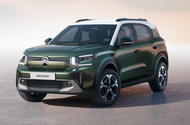At 4390mm, the new C3 Aircross is considerably longer than before
New second-generation family crossover is larger and more practical than before; electric version to come
The new Citroën C3 Aircross is set to be one of the smallest and cheapest seven-seaters when it lands later this year.
At 4.39m long, it is significantly shorter than the Dacia Jogger (4.5m), Citroën ë-Berlingo XL (4.8m) and Land Rover Discovery Sport (4.6m).
The new model makes the switch from the PFA1 platform, which dates back to the Peugeot 206, to Stellantis’s new affordability-focused Smart Car architecture.
Shared with the new Citroën C3 crossover, Fiat Grande Panda and Vauxhall Frontera, it is designed to suit several different types of powertrains. To that end, the C3 Aircross will be available with a choice of petrol, mild-hybrid and battery-electric power.
The petrol option is Stellantis’s ubiquitous turbocharged 1.2-litre ‘Puretech’ three-cylinder, sending 100bhp to the front wheels through a six-speed manual gearbox.
The mild-hybrid powerplant is an evolution of the same lump, said to comprise 40% new components including a timing chain (rather than a belt) and a variable-geometry turbocharger.
It’s mated to a dual-clutch automatic ‘box fitted with a 28bhp permanent magnet synchronous motor, which is fed by a small 48V lithium-ion battery mounted under the floor. Citroën claims the system is capable of completing around half of city driving on the motor alone.
Both the petrol and the mild hybrid are available with five or seven seats, whereas the range-topping EV is available only with five.
It uses the same electric powertrain as the smaller ë-C3, with a 111bhp motor on the front wheels and a 44kWh lithium-iron-phosphate (LFP) battery pack. It is claimed to allow 186 miles of driving between recharges, down 17 miles compared with the ë-C3.
A larger battery will become available next year, boosting range to more than 250 miles. Either version can be recharged at rates up to 100kW (DC).
Citroën has yet to declare a 0-62mph sprint time, but it is undoubtedly slower than the 10.4sec claimed for the ë-C3, given the Aircross’s larger size. It said the SUV offers “sufficient performance to slot into everyday traffic”, hinting at its town-focused billing.
The brand added that it prioritised comfort in developing the Aircross, utilising the same hydraulic bump stops as the C3, fettled to support the weight of up to seven passengers.
Inside, it gets a head-up driver’s display and a 10.25 infotainment touchscreen. The first and second rows get two USB-C charging ports each, and range-topping Max cars also get a 15W wireless charger up front.
Order books for the C3 Aircross open in September, with prices expected to start below the £20,000 mark for the entry-level petrol car. The Dacia Jogger is currently the only seven-seater on sale for less than £20,000, starting at £18,295.







